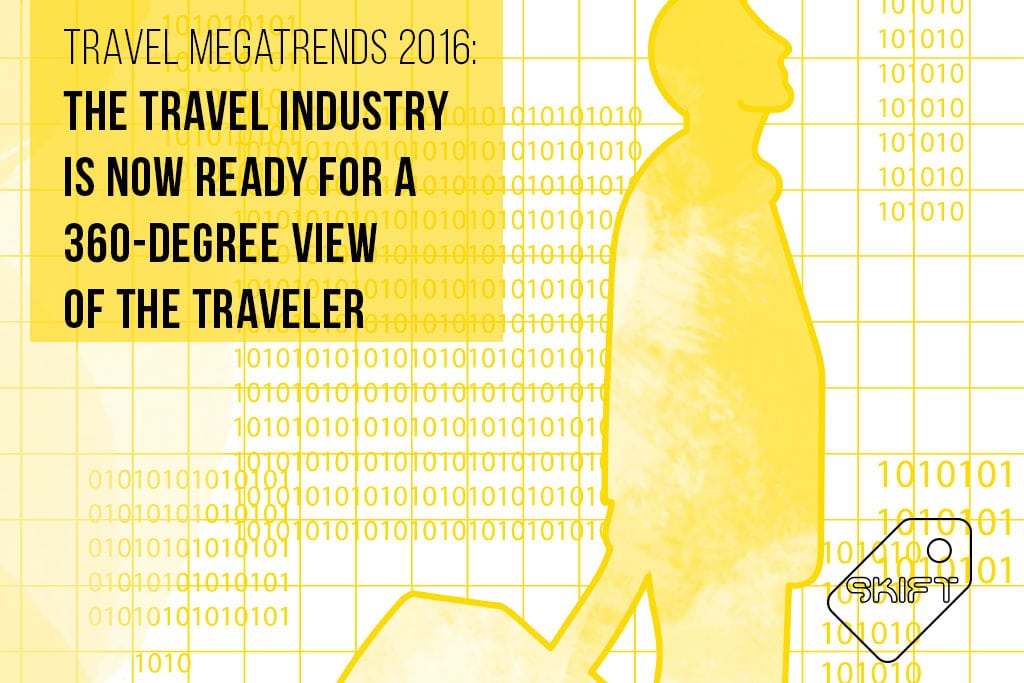Skift Take
With this comprehensive view into the traveler’s journey, the industry is poised to elevate and per-sonalize the travel experience further than ever.
Earlier this season we launched our annual package, Megatrends Defining Travel in 2016, where we identify the global trends in travel in 2016 and beyond.
Data, it has often been said lately, is the new oil. Just as oil in the 19th century was an untapped resource that ushered in wholesale changes to the world economy, so is data, which has the potential to make businesses smarter and turn all marketing communication into one-on-one conversations with customers.
Download the Full Megatrends Report
Personalization and the Journey
In 2016, this torrent of change will engulf the travel industry. Travel companies have traditionally helped consumers go on a journey. Now, the industry is mining the customer’s journey to do a better job.
In the past, a hotel would know when a guest has booked and could track some behaviors while they are on site, but understood much less about that consumer’s overall trip — where they were travel-ing to next and how they would be getting there.
That is changing with the wide adoption of mobile and willingness of consumers to interact with travel brands in a growing number of ways. The speed with which solutions providers are rushing to tap into the increasing amount of available consumer data, and evolving technology means that in the coming year, marketers will approach an all-encompassing view into customer behavior and preferences.
Helping to drive this are the evolving CRM systems and technologies underpinning them, providing more details on travelers than in the past. The rapid shift of CRM technology into the cloud has meant lower cost of entry and more rapid deployment for brands. Solutions providers have been working to help clients deepen their understanding of customers’ purchase paths and long-term behavior, offering brands a wealth of customer data trails, drawn from social media, Google and elsewhere, based simply on a customer’s name and phone number.
Data from online reputation management (ORM) efforts, including travel reviews and survey data, is being integrated into CRM programs while major hotel brands are building more robust customer service efforts on social media, and integrating this data into their prospecting and retargeting efforts. Mobile messaging is enjoying a larger role as part of a brand’s communication stack, and hotels and airlines have made greater investments in this area.
This means more data from a wider range of sources and steps in their path to travel, allowing for personalized messaging on a grand scale. Consumers are sharing more information than ever, and while brands must be careful not to overstep with respect to consumer privacy, those that strike the right balance have a far more robust understanding of the traveler.
Context-aware apps and those using beacon technology has deepened this further, allowing brands to present customers with offers or services based on their location within a hotel or travel journey, such as Marriott’s LocalPerks or James Hotels’ James Pocket Assistant. Mobile deep-linking is also allowing mobile apps to reach outside their silos, creating potential for cross-app marketing, and a seamless experience for customers. Such a 360-degree view into customer behavior opens up a huge number of possibilities for travel marketers, from leveraging a larger number of channels more effectively, to making the growing amount of consumer data more actionable.
The Daily Newsletter
Our daily coverage of the global travel industry. Written by editors and analysts from across Skift’s brands.
Have a confidential tip for Skift? Get in touch
Tags: megatrends
